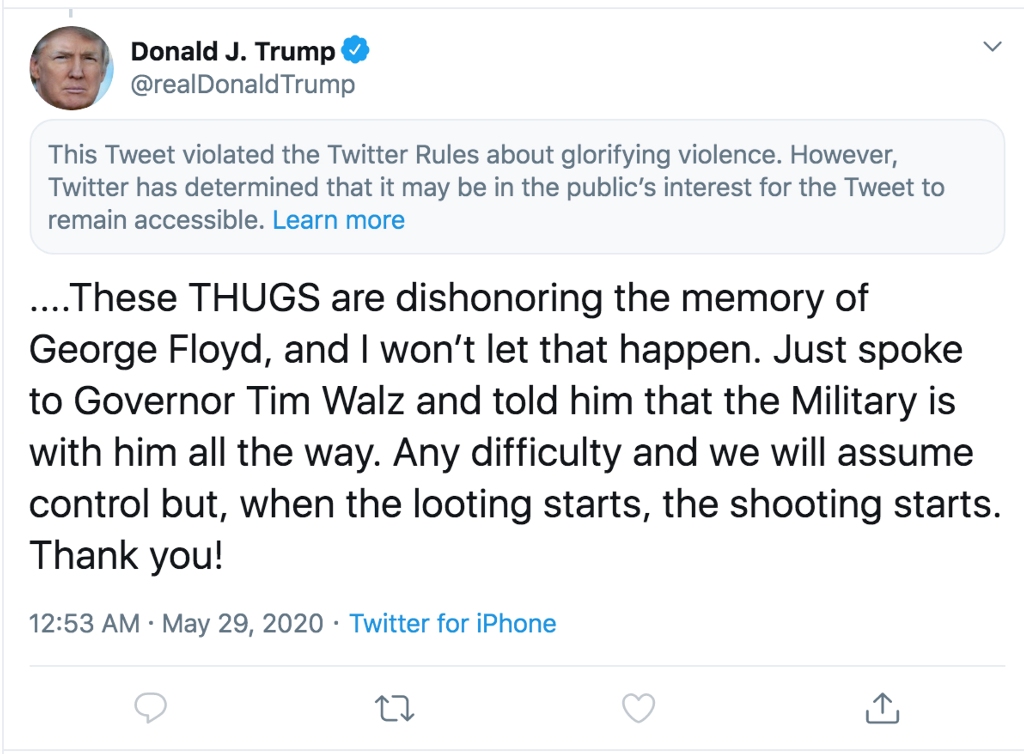Facebook is starting to bend under pressure, as advertisers continue to boycott it. It says it will now label potentially harmful posts that it does not remove, due to their news value.
The “Stop Hate for Profit” campaign was started by US civil rights groups after the killing of George Floyd in May while in police custody. The organisers have said Facebook allows “racist, violent and verifiably false content to run rampant on its platform”. The issue came to light after Facebook refused to take any action in regard to President Trump’s post encouraging violence against Black Lives Matter protesters, and the subsequent internal protestations and action by Facebook Employees. One such employee wrote, “The hateful rhetoric advocating violence against black demonstrators by the US President does not warrant defense under the guise of freedom of expression.”
Black Lives Matter President Hawk Newsom explained in a Fox News interview that only when property was destroyed in protests did the state start to take action against the police officers who were accused of killing black citizens.
Such direct action to hurt the financial interests of those in power is increasingly being seen as the only effective way to get change in democracies that clearly serve the wealthy elite at the expense of everyone else.
The BBC published a video article entitled “stop using our pain to attract black consumers”, which identified how many corporations are rushing to declare their support for change, and many are also reviewing their own diversity and recruitment policies.
Much of the mainstream media continued to focus attention on the violence associated with Black Live Matters protests, while at the same time telling the stories of individual incidents of racial abuse. Celebrities and corporations alike are queuing up to disavow their past insensitivity to racism, renounce their privilege, or just loudly declare their support for the movement to end racism. Many observers are rightly skeptical about how deeply this self-introspection is and how far it will go.
In the capitalist societies of the “free world” anti-racist sentiment will always gravitate towards superficial token changes, that avoid the underlying factors that allow racism to flourish.
To honestly address the structural and institutional racism that is inherent in such societies takes one down a path that questions the foundation and ideology itself.
Racism itself was invented by the white elite to justify their slave trade and colonisation of Africa and Asia, which of course was driven by capitalist greed. Capitalism requires there to be haves and have-nots. Overseas the have-nots can be exploited, as part of the colonial project, and at home they too can be, unless a tribal or nationalistic sentiment can temporarily generate a feeling of unity and fair treatment. It won’t be long before that temporary unity is broken apart, as it was only ever founded upon the same arbitrary basis as race, tribe and nation are.
To seriously question racist societies is to question the legitimacy of their economic foundation, both historically and in the present, as exploitation of the minority is as much the mantra today as it was then. In fact democracy itself comes under scrutiny, as it promises the mighty majority to get what they want at the expense of the weaker minority. Questioning the structural and institutional racism of the West is to question whether might really is right.
The white majority in America who approved of, or were happy to get richer from redlining practices from 1930s until 1970s, were, in their view, free to exploit the black minority for their own gain; just as the plantation owners who exploited slave labour had been. Questioning such racial discrimination, including the unequal recruitment practices today, is actually questioning whether we are free to benefit as we please and exploit others according to their relative power. This in turn calls into question the very same practices of the capitalist corporations who exploit overseas labour in countries whose regimes are mere agents of Western governments.
If might is not right here, and exploitation according to accidents of birth, ethnicity and colour are wrong here, then surely they must be wrong over there as well. If the capitalist economy relies upon such exploitation, then maybe it is founded on an incorrect basis. If the nation itself has economic roots in such inhumanity, then does it have the right to still exist as a nation? If democracy celebrates such inequality and exploitation, then is it even fit for humankind anymore?
Such questioning leads to one of two paths: questioning the intellectual basis and justification for all this freedom and exploitation, which is the secular belief; or avoiding further questioning to avoid further discomfort, and focus instead on making sure that I myself get with the majority and look for a new minority to exploit, so that the economy can prosper. The latter, of course, is favoured by the wealthy elite, and echoed in their media machine, which preserves their privilege at the expense of anyone who gets in their way.
Without an objective measure of right and wrong, of what can be owned and what cannot, of how to deal with others, and on what basis we should unite; such protestations against oppression ultimately fail to end the oppression, which itself is founded upon the practice of man making himself legislator over others.
Islam lifted humanity out of the oppression of man-made legislation, and when it is implemented will end all forms of racism and exploitation, internally and externally, whether by individuals, corporations, institutions or the state.
Yahya Nisbet
Media Representative of Hizb ut Tahrir in Britain

